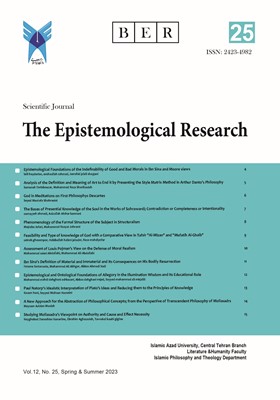Epistemological Foundations of the Indefinability of Good and Bad Morals in Ibn Sina and Moore views
Subject Areas : Epistemological researches
leili heydarian
1
,
enshaallah rahmati
2
*
,
jamshid jalali sheyjani
3
![]()
1 - Islamic Philosophy and Theology, Faculty of Theology and Islamic Studies, Yadegar Imam Branch, Azad University, ShahreRey. Iran
2 - Professor of Islamic Philosophy and Wisdom, Central Tehran Branch. Islamic Azad University Tehran, Iran
3 - Department of Religions and Mysticism, Yadegar-e-Imam Khomeini(RAH) Shahr-e-Rey Branch, Islamic Azad University, Tehran, Iran.
Keywords: realism, Ibn Sina, Naturalistic fallacy, intuitionism, Moore,
Abstract :
In this article, by analyzing the opinions of Avicenna and Moore, about the indefinability of good and bad morals, their attitude is explained from the epistemological point of view, The main problem of the research is Avicenna and Moore's attitude about criticizing the naturalistic criterion and criteria for carrying moral characteristics such as good and bad in moral issues. Avicenna states in his opinions that moderation as a metaphysical and natural matter cannot be a criterion for the good or badness of moral issues in all fields, and Moore, by analyzing the naturalistic fallacy, considers pleasure or harmony with nature as the criterion and criterion for carrying good and bad. He does not know moral issues. The results of the research show that the approach of these two thinkers to prove their claim is to pay attention to the logical problem that occurs in the comparison of knowing good and bad with things such as moderation, pleasure, and harmony with nature. To answer the problem, Avicenna and Moore defend the non-naturalistic realism of moral propositions, in the meantime, emphasizing the intuition of the characteristics in the intellectual intuition of the people to find criteria and criteria for the truth and falsity of moral propositions makes it possible to discuss the opinions of these two thinkers. The research method is to analyze the content of the opinions of these two philosophers in order to create a dialogue to compare their opinions.
ابنسینا، حسین بن عبدالله، (1404ق) منطق شفا، تحقیق سعید زائد، قم، انتشارات مکتبه آیه الله مرعشی.
همو. (1413ق). الاشارات و التنبیهات، شرح نصیر الدین الطوسی، تحقیق سلیمان دنیا، بیروت، موسسه النعمان.
همو. (1360). دانش نامه علایی، تهران، کتابخانه فارابی.
همو. (1373). عیون الحکمه مع شرح عیون الحکمه، شرح امام فخر رازی، تهران، موسسه الصادق للطباعه و النشر.
همو. (1379). النجاه من الغرق فی بحر الضلالات، تصحصح محمدتقی دانش پژوه، تهران، انتشارات دانشگاه تهران.
ارسطو. (1378). اخلاق نیکوماخوسی، ترجمه محمدحسن لطفی، تهران، طرح نو.
آبلسون، رازیل و نیلسن، کی. (1393). تاریخ فلسفه اخلاق، در دانشنامه فلسفه اخلاق، ویراسته پل ادواردز و دونالد ام بورچرت، ترجمه انشاء الله رحمتی، تهران، سوفیا.
جوادی، محسن. (1391). حکمت عملی شیخ الرئیس، تهران، چنار.
دنسی، جاناتان. (1393). شهودگرایی اخلاقی، در دانشنامه فلسفه اخلاق، ویراسته پل ادواردز و دونالد ام بورچرت، ترجمه انشاء الله رحمتی، تهران، سوفیا.
طوسی، نصیرالدین. (1361). اساس الاقتباس، تصحیح مدرس رضوی، تهران، دانشگاه تهران.
عبدلآبادی، علیاکبر. (1387). معنا و متعلق شهود در نظریه اخلاقی جی.ئی.مور، مجله فلسفه، سال 36، شماره 2، صص43-31.
فرانکنا، کی ویلیام. (1376). فلسفه اخلاق، ترجمه هادی صادقی، تهران، موسسه فرهنگی طه.
گنسلر، هری جی. (1375). درآمدی جدید به فلسفة اخلاق، ترجمة حمیده بحرینی، تهران، انتشارات آسمان خیال.
مصباح یزدی، محمدتقی. (1383). فلسفه اخلاق، تحقیق و نگارش احمدحسین شریفی. تهران، سازمان تبلیغات اسلامی.
همو. (1383). نقد و بررسى مکاتب اخلاقى، نگارش حسین شریفی، قم، موسسه آموزشی و پژوهشی امام خمینی.
مک ناوتن، دیوید. (1380). بصیرت اخلاقی، ترجمه محمود فتحعلی، قم، انتشارات موسسه آموزشی و پژوهشی امام خمینی.
مور، جورج ادوارد. (1388). مبانی اخلاق، ترجمه غلامحسین توکلی و علی عسگری یزدی، تهران، پژوهشگاه علوم و فرهنگ اسلامی.
وارنوک، مری. (1387). فلسفه اخلاق در قرن بیستم، ترجمه ابوالقاسم فنائی، قم، بوستان کتاب.
ویرینین، پیکا. (1393). واقعگرایی اخلاقی، در دانشنامه فلسفه اخلاق، ویراسته پل ادواردز و دونالد ام بورچرت، ترجمه انشاء الله رحمتی، تهران، سوفیا.
ویلیامز، برنارد. (1383). فلسفه اخلاق، ترجمه زهرا جلالی، قم، انتشارات دفتر نشر معارف.
وینچ، پیتر. (1372). ایده علم اجتماعی و پیوند آن با فلسفه، ترجمه جمعی از مترجمان، تهران، سمت.
هولمز، رابرت. (1385). مبانی فلسفه اخلاق، ترجمه مسعود علیا، تهران، ققنوس.
Dancy, Jonathan, (1993), “Moral Reasons”Blackwell, Oxford Uk & Cambridge USA.
Ewing, Alfred Cyril; (1960) Ethics; London، The English Universities Press.
Huemer, M.,(1970), Ethical Intuitionism, Basingstoke، Palgrave Macmillan.
Sylvester, Robert Peter (1990); The Moral Philosophy of G. E. Moore; Philadelphia، Temple University Press.
Warnock, Jeoffrey James (1985); Contemporary Moral Philosophy; Hong Kong، The Macmillan Press.
Moore, George Edward; (1965) Ethics; New York، Oxford University Press.
_||_
